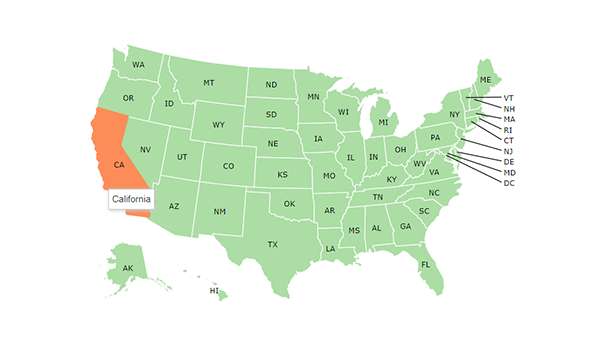File Small Claims Court in California
In the Small Claims Court of California, an individual cannot ask for more than $10,000 in a claim. Corporations and other entities (like government entities) cannot ask for more than $5,000. You can file as many claims up to $2,500 each.
In the State of California, Small Claims Filing offers complete Filing and Serving services. Court fees are (1) $30 for suits under $1,500 (2) $50 for $1,501-$5,000 & (3) $75 for $5,001-$10,000. Court fees are applied later during the process and not today. Serving includes restricted mail service & sheriff/private process options will be provided to you later during the procedure. All fees are added to the case against the defendant so you can recover these costs. We will handle your entire small claims from start to finish!

To FILE your case and SERVE the Defendant, the price for this state is $74.95.
Quick Facts About Small Claims California
| Small Claims Limit | $20,000 (including attorney’s fees) |
| Cost to File | $54 |
| Cost to Serve | $75-$125 |
| Can a lawyer represent me? | Yes |
| Virtual Hearings | Some courts have the option to attend the hearing virtually. |
| Deadline to file | Statute of limitations apply to small claims cases. |
California Small Claim Filing
Why do you waste your time energy after a small claim? We are here to take pain for you. We are literate enough about the Small Claims Court System. We will get your claim filed and make you free from worries. We file California Small Claim in the relevant court. We provide proof after the task is completed. Our policy provides individuals and companies peace of mind.
Suing Someone in California Court Or Being Sued?
We, in California Small Claim filing offer in case if you want to file a case against somebody, we can help by:
- Serving Your Small Claims Papers Before The Deadline.
- Serve Your Claim In Proper Legal Way for California Court.
- Fill Your Proof With The Acampo Court.


In case you are sued, we talk to the relevant person or company to settle things down. We appeal your small claim judgment as well.
E-Filing Services in California
Small Claim California E-file your legal documents to California courts that accept E-Filling on your behalf.
Small Claims For Bad Cheque Or Payment in California
California Small Claim settles all money matters reliably and authentically if you are deceived in money matters.
Recent Cases Filed in California Small Claims Court
File Small Claims in Acampo For Security Deposit
In California Small Claim, if your former landlord refuses to return the security deposited you paid, we offer our services.
California Small Claims Filing if Refusing To Pay After A Car Accident
If someone ruins your car in California and refuses to pay for its repair, you can file small claims to recover your car accident damage. Small claims filing prepares all the documents to file a small claim in California court.
Direct Legal Small Claim Service in California
We provide full service of handling of writs both state and federal.
Court Filling Small Claim California Services
Throughout California in the small claims, we offer services to accommodate on the same day, next day or routine service.
Who Can Sue Small Claim In >Court California?
Those who can claim for Small Claim California are listed below:
- Married Couples can file small claims in Acampo court.
- Business Partnerships can also file small claims
- Corporations can file small claims
- Government Agencies can file small claims
- Motor Vehicle Claims can be handled
- Minors can also file small claims in the court of California
- Prisoners can file small claims
- Bill Collectors can also file small claims in California
How Much Does It Cost To File A Small Claim Court, California?
There is a $30 filing fee for a case asking for up to $1500. To claim over $1500, and up to $5,000, there is a filing fee of $50. If your claim is above $5,000, the filing fee is $75. If you file more than 12 cases in a year, subsequent cases will cost $100.



